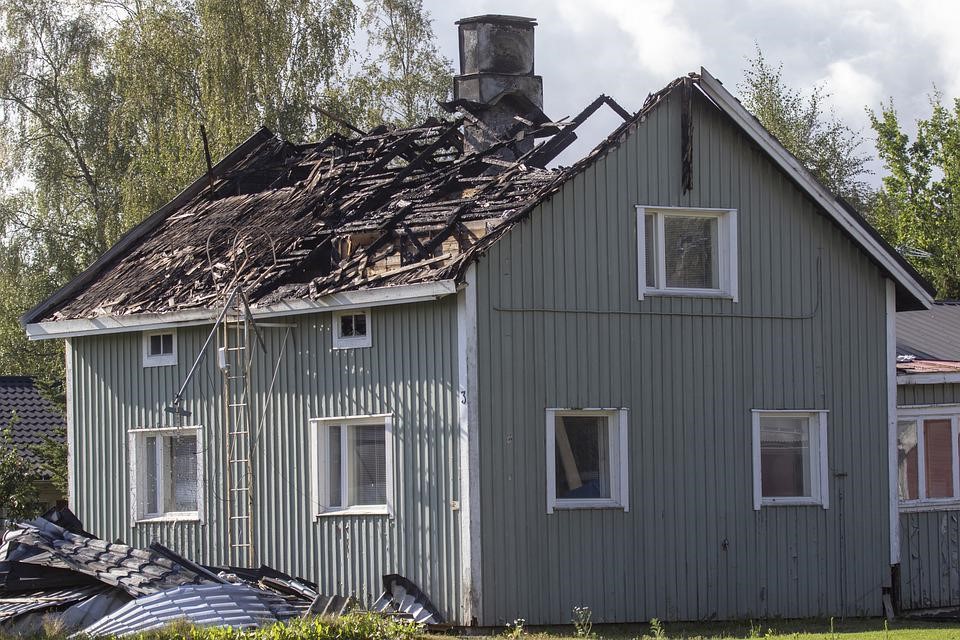
How to Prepare for a Successful Move to Denver: a Step-by-Step Guide
Moving to a new city can be both exciting and overwhelming. Denver, known for its vibrant culture, stunning natural beauty, and thriving job market, is

A good number of the houses we live in have had some form of fire threat over the years.
We repair them and move on or learn to live with the evidence if it doesn’t affect us too much. We only experience the full implication of fire damage when the house is up for sale.
There is the fear that the house’s history will scare away potential buyers or the listing will stay on the market until it becomes obsolete.
While it is true that the house will be undervalued depending on the extent of the fire damage it suffered, that doesn’t automatically translate to it can’t be sold.
You will be surprised to discover that you can sell the house even after fire damage. Keep reading and find out who will buy your house with fire damage.
Repairing house fire damage is an elaborate process involving hiring contractors, supervising the work and having to live in the house as the work continues if it is your primary residence.
It’s much easier and convenient to sell it the way it is, but this might not be the best move as it significantly reduces your pool of prospective buyers and the overall offer prices.
The buyer pool shrinks because many investors will steer clear of a fire damaged property because they don’t want to go through the rehabilitating process and fire damage restoration. The ones still willing to look at the fire damaged home will expect huge discounts for their risk, so their offers might be significantly below the market price.
You can sell a damaged house much faster and avoid holding costs with cheap repairs that automatically enhance the house’s value. You will be poised to break even or make a profit from the sale just by undertaking these renovations.
It is especially true when the market is saturated with damaged properties, forcing sellers to volunteer heavy discounts for their houses to be bought. Your listing will stand out from the rest.
However, you should be cautious with the cost of renovation. It is possible to spend too much on renovations beyond what can be recovered from the sale of the house. Sometimes the value addition is not worth the cost.

In some circumstances, selling a fire damaged house the way it is will make more sense than repairing it. Like when you have little equity in the house and the cost of rehabilitating the house is so high that it will affect your ability to pay off the loan. It might also have been a small fire with minor damage you feel will not influence the buyers’ decision.
Cosmetic damages like soot deposits on walls and floors don’t greatly impact the house’s value. They are easy to correct, and you can opt to repair them yourself or let the home buyer do it.
However, if the fire was severe to the extent that the house’s structural integrity was in question, the repair costs could be high, and the house might be considered unsafe. This happens when core parts of the property, like support beams, are destroyed in the fire.
No matter the motivation, you should be prepared to give discounts if you sell a house with fire damage. The discount will depend on the extent of the fire damage because the home buyer is also thinking of what it will take to restore the house.
Sometimes it is impossible to restore the house completely, especially when the damage is substantial. Besides the flame, smoke, and soot, the water used to put out the fire also causes its own damage. The costs might surpass your insurance coverage and available resources, leaving you with no option but to sell the house as is.
While it is a good idea to repair the damage before listing the house, it doesn’t make sense if it will eat up all your equity. It also takes time to restore the house, which you may not have when the damage is too widespread, or your move is urgent.
The good thing about fire insurance when you are not planning to repair the house is that the payout will complement what you get from the sale. It covers the discount you will have to give to keep buyers interested.
What happens when no buyers are willing or able to bid on the house because of the fire damage, and you need to move urgently?
Many buyers rely on financing from lending institutions who want to be convinced that the house has been fully restored and the cause of the fire has been addressed. Otherwise, they will not qualify for the mortgage, meaning they can’t buy the house.
The longer the house stays on the market, the higher the chances it will not find a house buyer or its price will drop further. You need to get creative with how you are selling it.
Such projects require buyers with experience dealing with fire damage and cash to purchase and repair the house without seeking financiers. A professional real estate investor specializes in purchasing properties that need major and costly repairs, making the necessary renovations and flipping these once burdensome houses for a profit.
A real estate investor oversees the repairs themselves or supervises crews of licensed professionals with construction experience who can restore houses for much less than it would cost the average buyer. They don’t have to rely on third-party inspections or appraisals before making an offer.
Because they have cash, they also move without the bottlenecks associated with a mortgage approval process. Their motivation is to end up with a house whose eventual market value will be higher than what it took to buy and renovate.
These buyers will give you quick and fair offers, which is ideal if you are looking for a fast sale. Selling to cash buyers also helps you to avoid real estate agent costs and many other closing costs. You don’t have to stage the house or subject your family to showings and open house events.
Consumer protection is taken very seriously, which is why every state has its version of a property disclosure statement which you, as the seller and homeowner, should make. It highlights damages that have occurred to the property and the steps taken to remedy them so that prospective buyers can factor them in their decision-making.
The cause of the house fire and the damage’s extent are key influencers of decision making because the buyer wants to know if the house’s structural integrity was compromised and if there is a possibility of a recurrence of the incident in the future.
For instance, if it was an electric fault, they will want to know that the wiring has since been corrected. A potential buyer will also want to know if any structural damage was taken care of after the house fire.
The statement can be in the form of a pre-drafted form that you fill in and may or may not refer specifically to fire damage. We recommend being upfront with information about fire damage regardless of how the form is worded. The buyer can seek legal redress if they discover you lied, covered up, or did not fully disclose any fire history, even if it happened long ago and you have made the necessary repairs.
It is good practice to keep copies of all documents related to the home fire as proof of previous fire damage and to make it easy to explain the circumstances to a potential buyer. Such documents include assessment reports, police reports, repair documents and insurance claim information.
Rehabilitating a fire damaged house will get you a better market price when you list it, but it requires time and resources. Selling the property as is, on the other hand, relieves you from a load of restoration. The extent to which these variables affect the sale are determined by the specific circumstances surrounding the particular sale.
Now that you know the house can still be sold after a fire and you have a few ideas on how to go about it, you can assess your situation and determine what is best for you and your family. Each approach has its own unique advantages and disadvantages. Compare the net amount you will get for the house for both options, deduct expenses and add the insurance payoff to the mix.
If the numbers compare favorably for both options, selling the home as is for a fair price will still be the better option because it saves on time and effort.

WeBuyHousesinDenver.org is a cash for houses company and we are experts at buying houses in Denver and all of Colorado. Our mission is to give the people of the Mile High city the best solution to sell any house. When you sell your house to us there are:
This is how selling a house in Colorado should be, whether you’re looking to sell your house in Denver, Lakewood, Aurora, or beyond!
Fill out the form to get your no-obligation cash offer today.
The latest real estate news, forecasts, insight, and advice are brought to you by the leading authorities in the Denver housing market. We have ears and boots on the ground in the Mile High reporting the facts. Extensive research goes into all our articles and we gather information from trusted real estate experts, renowned local Denver housing specialists, home buyers, and more. We buy houses Denver and as accomplished professionals with a proven track record, we now want to share our experiences with you. Please enjoy!


Moving to a new city can be both exciting and overwhelming. Denver, known for its vibrant culture, stunning natural beauty, and thriving job market, is
Value add in real estate means finding ways to make a property more valuable. This can include things like renovating, improving operations, or changing how
Colorado Springs is a great location for rental property owners, but even in high-demand rental markets, selling your rental property sometimes makes financial sense. The
We’re a service-focused, home buyer that specializes in helping homeowners get rid of burdensome houses quickly. We are Colorado cash buyers who can buy your house fast with a fair all-cash offer. Imagine an instant online quote to sell as-is, without realtors and on your timeline! As a house buyer that’s what we offer. Therefore, if you need to sell your house fast and need a trusted professional home buying company look no further because we buy houses fast for cash.
We Buy Houses In Denver, 1337 Delaware St, Denver, CO 80204